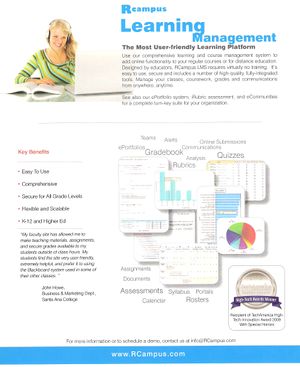Difference between revisions of "LMS"
(New page: thumb|Download a brochure for your school Learning Management System (LMS) is the practice of using computer software to organize and manage courses, course mater...) |
|||
| Line 31: | Line 31: | ||
| − | |||
| − | |||
| − | |||
| − | |||
| − | |||
| − | |||
| − | |||
| − | |||
| − | |||
Revision as of 23:38, 28 March 2018
Learning Management System (LMS) is the practice of using computer software to organize and manage courses, course materials, students, grades, quizzes, and communications. They are usually web-based.
LMS can be used as an add-on for a regular course, which allows for teachers to manage various aspects of teaching. It can also be used in distance learning or hybrid courses as the primary means of communication among teachers and students.
To start building courses, visit RCampus.
RCampus Learning Management System
RCampus Learning Management System is a web-based software system designed to facilitate the management of courses for faculty and students, especially by helping teachers and learners with course administration. The system can track the students' progress, which can be monitored by both teachers and students.
RCampus LMS is available to schools (see our licensing and hosting / outsourcing options). Its tools are available instantly to teachers and students at www.RCampus.com.
Features of RCampus LMS
Our tools are designed to be easy-to-use, quick to set-up and highly secure.
- Building multimedia class portals/websites
- Adding students automatically or manually
- Automatic building of the roster
- Copying and distributing coursework and assignments across multiple classes
- Email alerts for reminding upcoming tasks
- Collecting assignments using different submission settings
- Assigning and collecting multiple ePortfolios
- Managing and sharing documents and files using document center
- Grading students using gradebook complete with statistics and interactive graphs
- Organizing questions in the test bank
- Building quizzes for online assessment
- Using rubrics for communicating expectations and quickly assessing student work
- Building teams with dedicated team menus
- Using unified message system for threaded discussions and for sending messages to any combinations of recipients
- Managing events and assignment deadlines using calendar complete with automatic synchronization with students calendars
- Tracking to-do items
- Networking with others through eCommunities
- Bookmarking favorite items
- Many navigation shortcuts
- and more.
Definitions
- Course: A course refers to a specific subject of study, such as Basic Algebra, from which classes are offered.
- Class: A class is a single offering of a course.
See Also
- Faculty websites - Lists your courses on your website automatically.
- Faculty online groups - Collaborate with others.
- Rubrics - Use rubrics for assessment.
- ePortfolios - Assign Student ePortfolios for recording the learning process and demonstrating the learning outcome.
- Class creation - Quick guide for creating a class.
- Class properties - The page to add class information. Also explains each area.
- Class portal - About class websites.
- Class FAQ - Working with classes.
- Student registration - Two options to register students: self-registration and manual registration.
- Roster - Roster at-a-glance and How-to.
- Course - Definition of a course.
- Courses FAQ - Working with courses.
- Learning Management System - Features our Learning Management System.
More testimonials and case studies.
